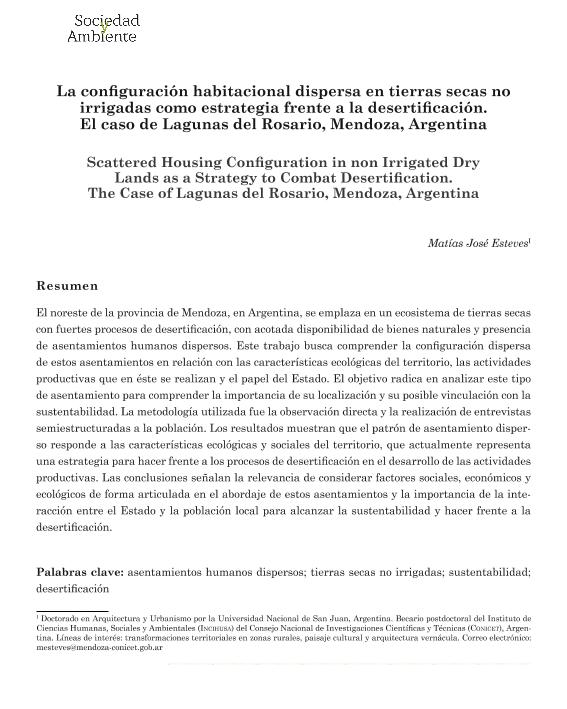Mostrar el registro sencillo del ítem
dc.contributor.author
Esteves, Matias Jose

dc.date.available
2019-12-10T17:59:16Z
dc.date.issued
2018-11
dc.identifier.citation
Esteves, Matias Jose; La configuración habitacional dispersa en tierras secas no irrigadas como estrategia frente a la desertificación: El caso de Lagunas del Rosario, Mendoza, Argentina; Colegio de la Frontera Sur; Sociedad y Ambiente; 18; 7; 11-2018; 71-94
dc.identifier.issn
2007-6576
dc.identifier.uri
http://hdl.handle.net/11336/91912
dc.description.abstract
El noreste de la provincia de Mendoza, en Argentina, se emplaza en un ecosistema de tierras secas con fuertes procesos de desertificación, con acotada disponibilidad de bienes naturales y presencia de asentamientos humanos dispersos. Este trabajo busca comprender la configuración dispersa de estos asentamientos en relación con las características ecológicas del territorio, las actividades productivas que en éste se realizan y el papel del Estado. El objetivo radica en analizar este tipo de asentamiento para comprender la importancia de su localización y su posible vinculación con la sustentabilidad. La metodología utilizada fue la observación directa y la realización de entrevistas semiestructuradas a la población. Los resultados muestran que el patrón de asentamiento disperso responde a las características ecológicas y sociales del territorio, que actualmente representa una estrategia para hacer frente a los procesos de desertificación en el desarrollo de las actividadesproductivas. Las conclusiones señalan la relevancia de considerar factores sociales, económicos y ecológicos de forma articulada en el abordaje de estos asentamientos y la importancia de la interacción entre el Estado y la población local para alcanzar la sustentabilidad y hacer frente a la desertificación.
dc.description.abstract
The northeast of the province of Mendoza (Argentina) is located in the drylands ecosystem, characterized by severe desertification, limited availability of natural resources and scattered human settlements. This article seeks to understand the scattered configuration of the settlements in relation to the ecological characteristics of the territory, the productive activities undertaken and the role of the state. The aim is to analyze this type of settlement to understand the importance of its current location and its link with sustainability. The methodology used was direct observation and semi-structured interviews with the local population together with bibliographic information. The results show that the scattered settlement pattern reflects the ecological and social characteristics of the territory and currently constitutes a strategy for dealing with desertification in the undertaking of productive activities. The conclusions highlight the importance of considering social, economic and ecological factors in an articulated manner in the approach to these settlements and the importance of the interaction between the state and the local population for achieving local sustainability and addressing desertification.
dc.format
application/pdf
dc.language.iso
spa
dc.publisher
Colegio de la Frontera Sur
dc.rights
info:eu-repo/semantics/openAccess
dc.rights.uri
https://creativecommons.org/licenses/by-nc-sa/2.5/ar/
dc.subject
ASENTAMIENTOS HUMANOS DISPERSOS
dc.subject
TIERRAS SECAS NO IRRIGADAS
dc.subject
SUSTENTABILIDAD
dc.subject
DESERTIFICACION
dc.subject.classification
Otras Humanidades

dc.subject.classification
Otras Humanidades

dc.subject.classification
HUMANIDADES

dc.title
La configuración habitacional dispersa en tierras secas no irrigadas como estrategia frente a la desertificación: El caso de Lagunas del Rosario, Mendoza, Argentina
dc.title
Scattered housing configuration in non irrigated dry lands as a strategy to combat desertification: The case of Lagunas del Rosario, Mendoza, Argentina
dc.type
info:eu-repo/semantics/article
dc.type
info:ar-repo/semantics/artículo
dc.type
info:eu-repo/semantics/publishedVersion
dc.date.updated
2019-10-24T18:20:10Z
dc.identifier.eissn
2007-6576
dc.journal.volume
18
dc.journal.number
7
dc.journal.pagination
71-94
dc.journal.pais
México

dc.journal.ciudad
Chiapas
dc.description.fil
Fil: Esteves, Matias Jose. Consejo Nacional de Investigaciones Científicas y Técnicas. Centro Científico Tecnológico Conicet - Mendoza. Instituto de Ciencias Humanas, Sociales y Ambientales; Argentina
dc.journal.title
Sociedad y Ambiente
dc.relation.alternativeid
info:eu-repo/semantics/altIdentifier/url/http://200.23.34.40/sociedadyambiente/index.php/sya/article/view/1876
dc.relation.alternativeid
info:eu-repo/semantics/altIdentifier/url/http://ref.scielo.org/n476bv
Archivos asociados
